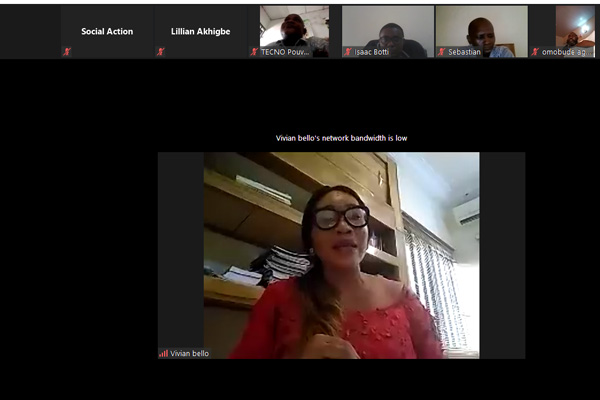
Civil Society Organisations (CSOs) from within and outside the Niger Delta region, in conjunction with representatives of various communities in the region, have called for a total change of leadership in the Niger Delta Development Commission, NDDC. They made the call at a virtual roundtable with the theme: POSITION DIALOGUE ON THE NDDC, which was convened by Social Development Integrated Centre (SOCIAL ACTION) and the African Centre for Media, Information and Literacy (AFRICMIL) on Friday, 17th July, 2020. The meeting was held in the light of events at the NDDC, ranging from allegations of contract frauds and fiscal recklessness, to Procurement law infractions, audit violations, cronyism, non-budgetary and extra-budgetary spending, and extensive disregard to procedural rules.
Speaking at the dialogue, the Project Director of SOCIAL ACTION, Mrs. Vivian Bellonwu-Okafor, in her welcome address, stated that “the task before us is not only moral, it is also historical; as we seek to soberly beam into the NDDC, x-ray its journey so far, side-by-side its mandate, and put forward our genuine thoughts, recommendations, and ideas on the way forward for the Commission”. She emphasised that, “SOCIAL ACTION and AFRICMIL are initiating this process to chart clear courses and find meaningful solutions to the issues”.
The convener of Take Back Nigeria Movement, Comrade Jaye Gaskia, who was present at the virtual meeting, lamented the institutional crisis witnessed at the NDDC which he attributed to a failure in governance in the agency. He said, “NDDC has been a commission for the disbursement of patronage, hence, there is a need for a radical overhaul of the Commission to reposition it”. He also noted that, “the communities in the Niger Delta must be involved in monitoring the execution of projects and should have a mechanism in place on how they can seek redress when they are affected”.
Also speaking, Comrade Ken Henshaw, the Director of the Centre for Social Studies and Development (WE THE PEOPLE), described the NDDC as a cesspool of corruption, stressing that several stakeholders in the government and at the grassroot-communities, are complicit in the corruption bedeviling the agency. He therefore recommended that, “the leadership structure of the NDDC must be ridden of politicians and the audit systems should be strengthened, through the involvement of civil societies in the ongoing audit procedure”. Similarly, Dr. Harry Udoh, the Coordinator of Akwa Ibom Civil Society Organisations, pointed out the urgent need for CSOs to play the role of third party – monitors in the audit process, as he further stated that, “the NDDC, as presently constituted, cannot deliver development. The Interim Management Committee of the agency should be discarded, and a new Board set up for the commission”. He also recommended the adoption of the Global Memorandum of Understanding (GMoU) as a development template, to drive project implementation and development in the Niger Delta.
Also in attendance at the meeting, were community representatives who decried the substandard quality of projects being executed by the NDDC in the Niger Delta region. Mrs. Rita Kigbara from Ogoni community of Rivers State, noted that most of these substandard projects of the NDDC, have no significant impact on the lives of the people living in the communities. Mr. Henry Eferegbo from Emohua community, Rivers state and Ms. Faith Osuoka of Engenni Community, Bayelsa State, lamented the absence of effective communication channels between the communities and the NDDC, stressing that the NDDC often implements projects which are not desired by the communities because the leadership of the Commission is insensitive to the needs of the communities. These views were reiterated by Mr. Sebastian Kpalap of Ogoni Community and other community representatives at the event, who called for more community participation through the setting up of a multi-stakeholder Foundation to manage the utilisation of resources channeled into the region, which include stolen assets that are recovered.
The meeting ended with the adoption of resolutions aimed at addressing the highlighted challenges plaguing the region. It was resolved that a Position Paper, containing the observations and recommendations of the CSOs and communities, shall be prepared and addressed to the President of Nigeria, Muhammadu Buhari through the media. The communiqué which shall be jointly issued by all stakeholders at the meeting, shall be published on Monday, July 20, 2020.
